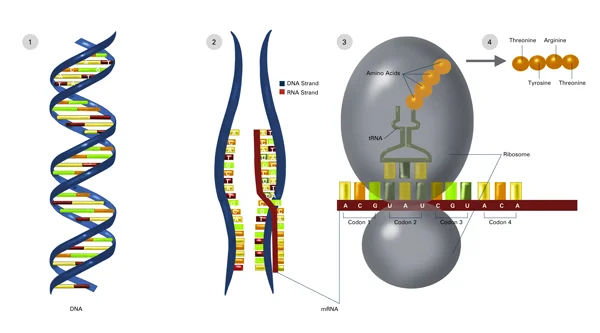Proteomics: the study of all proteins produced by a particular type of organism. (Batista, 176) The study of proteins encoded by genes. In the wake of the “human genome project” two new post-genomic fields have duly emerged - proteomics and “transcriptomics.” (Watson, 217)
New, fast, and efficient way to identify, compare, and study many proteins at one time. (Batiza, 1) The analysis of the "proteome" of a single species and the comparison of the proteomes of different species. Proteomics helps us to understand how the various levels of biology are related to one another. (Brooker, 12) Proteins impart or control the characteristics that create much of our individuality. (Lewis, 2) They confer a trait. (Lewis, 4) They form the bulk of the body’s "connective tissues," participate in "blood clotting," ("synaptic transmission"), and muscle contraction. (Lewis, 20)
Isoforms: different forms of a protein, that may be produced from different genes, or from the same gene by "alternative splicing." (MeSH) From 40% to 60% of human genes encode isoforms. (Lewis, 185)
Protein Sorting: the process of sorting proteins to their correct locations. (Brooker, 115)
Protein Synthesis: the turning on of genes (that) gives rise to proteins that are essential for the growth of new synaptic connections. (Kandel5, 6) The making of new proteins. "Long-term memory" storage requires the synthesis of new proteins. (Kandel, 212) The process by which proteins are built up from "amino acids" using information carried by the "genetic code" on the cell's "DNA." The genetic code representing a gene is first copied onto "messenger RNA" (mRNA) in the "nucleus" of the cell. This "mRNA" molecule moves out into the "cytoplasm" of the cell. Here the code on the mRNA molecule is used to control the production of a polypeptide chain by a "ribosome." (Indge, 222) Protein synthesis is extremely fast, requiring only seconds to make chains of one hundred or so "amino acids." (Venter, 38) Proteins start to move toward their destination as they are being synthesized. (Lewis, 191)
Proteome: the complete complement of proteins that a cell or organism can make. (Brooker, 12) A collection of proteins. The human proteome is the collection of proteins found in the human body. A proteome can also refer to the set of proteins in a particular cell. (GNN) The proteome of a cell determines its structure and function. During the last decade or so, researchers have also discovered an association between proteome changes and disease. (Brooker, 68)
